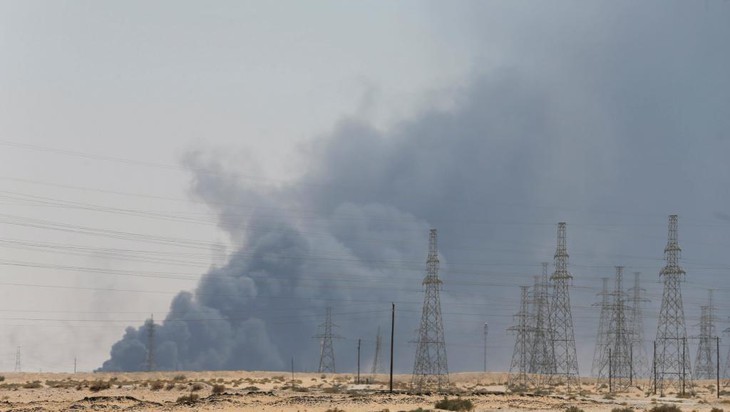(VOVWORLD) - This year the Middle East has continued to be overshadowed by conflicts, violence, and crises. The whole region sees potential risks of instability. VOV reviews:
 Smokes are seen on Abqaiq, an oil company in Aramco, Saudi Arabia, after a drone airstrike, on September 14, 2019 (Photo REUTERS / Stringer) Smokes are seen on Abqaiq, an oil company in Aramco, Saudi Arabia, after a drone airstrike, on September 14, 2019 (Photo REUTERS / Stringer)
|
Syrian crisis
The situation in Syria has been complicated with violence, conflicts, sectarian division, and battle for influence. By the end of 2019, Syria has been divided by scores of forces, including foreign forces. After Turkish offensive into north-eastern Syria, code-named Operation Peace Spring, in two weeks in October, the political situation in Syria has changed significantly. The US has lost its influence to Russia. Both Turkey and Syria have carried on with their own intentions.
But peace and stability have not been achieved. Currently fighting is fiercely taking place in southern Idlib, Daraa, and Damascus. Clashes and violence across Syria between the army, insurgents, and foreign troops have claimed the lives of thousands of people.
Palestine-Israel conflict
Another trouble in the Middle East is the prolonged conflict between Palestine and Israel. The US’s recognition of Jerusalem as Israel’s capital, relocation of US embassy to Jerusalem, and support for Israeli settlements have intensified tension in Palestinian territories. Regular fire exchanges have occurred between Palestinian gunmen in the Gaza and Israeli armies.
The public has repeatedly called on both sides to practice restraints and support negotiating effort.
Tensions in the Strait of Hormuz
Tension has escalated severely in the Strait of Hormuz this year. The US and Iran were on the edge of a military confrontation when the US deployed the carrier Abraham Lincoln to the Strait in May. Iran shot down a US navy drone in June. US President Donald Trump approved military strikes against Iran in retaliation, but the order was withdrawn at the last minutes. Iran arrested many foreign oil tankers in the Strait of Hormuz for different accusations.
The US and its allies, Saudi Arabia and the UAE, have many timed accused Iran of using authorized forces in Yemen, Syria, and Iraq. Tehran said Washington has threatened regional peace by deploying carriers and other weaponry to the Strait. Iran recently said it will continue to narrow its commitments in the nuclear deal signed with 6 countries in 2015, if EU countries don’t have practical move to protect the deal.
Little hope
In a gloomy situation, there was a dim of light. First, the June 2017 diplomatic crisis between Saudi Arabia, the UAE, Bahrain, and Egypt against Qatar has been easing. Saudi Arabia invited Qatar to the 40th conference of the Gulf Cooperation Council in Ryadh in December 10. Qatar’s Foreign Minister Mohammed bin Abdulrahman al-Thani said impasse in relations with Saudi Arabia has been cleared.
The fight against terrorist group IS has recorded more results in Syria and Iraq. IS’s controlled areas have been narrowed while its leader Abu Bakr al-Baghdadi was killed by the US commandos in Syria on October 26.